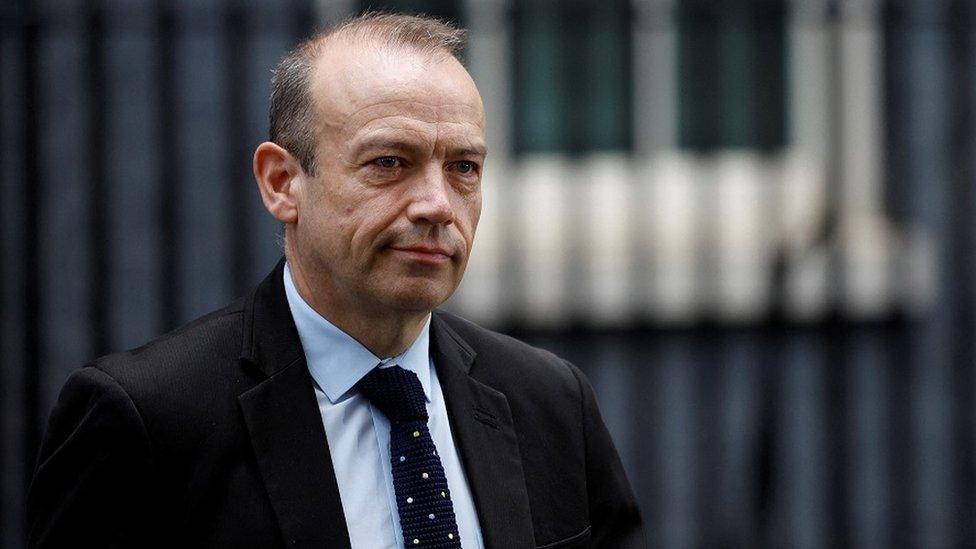NI Protocol: NI secretary repeats assembly election pledge
- Published
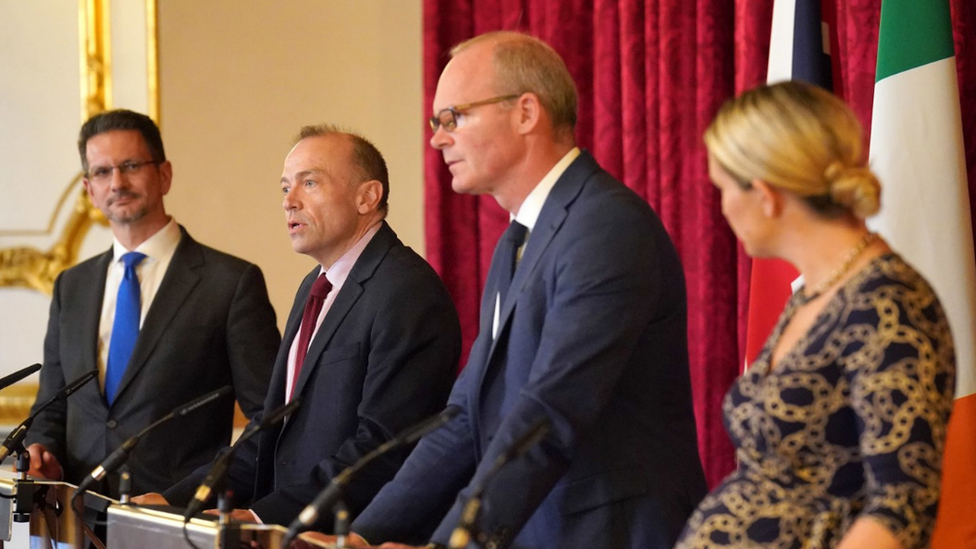
Chris Heaton-Harris (second left) and Simon Coveney (third left) spoke following a meeting in London
Northern Ireland Secretary Chris Heaton-Harris has again warned he will call another Northern Ireland Assembly election if power-sharing is not restored within weeks.
He said he wanted to be "positive" about the chances of a new deal over the Northern Ireland Protocol.
Earlier Irish Foreign Minister Simon Coveney said a "new air of positivity has created a flicker of optimism" in talks over the protocol.
The men have been in talks in London.
Power-sharing in Northern Ireland collapsed after the Democratic Unionist Party (DUP) refused to serve in the Stormont Executive due to their their concerns about the protocol.
Under the law, another assembly election has to be held if the executive is not restored by 28 October.
The protocol is part of the Brexit deal that keeps Northern Ireland aligned with the EU's single market to ensure free trade can continue across the Irish land border.
Many unionists, however, are opposed to it.
Mr Heaton-Harris said he hoped the Northern Ireland Protocol Bill, external, which is going through the UK Parliament would become a "redundant piece of legislation" if a deal was reached.
He delivered his assessment after a meeting of the British-Irish Intergovernmental Conference (BIIGC) in London.
After the meeting on Friday, Mr Heaton-Harris said: "I want to be very positive about the chances of getting a negotiated solution."
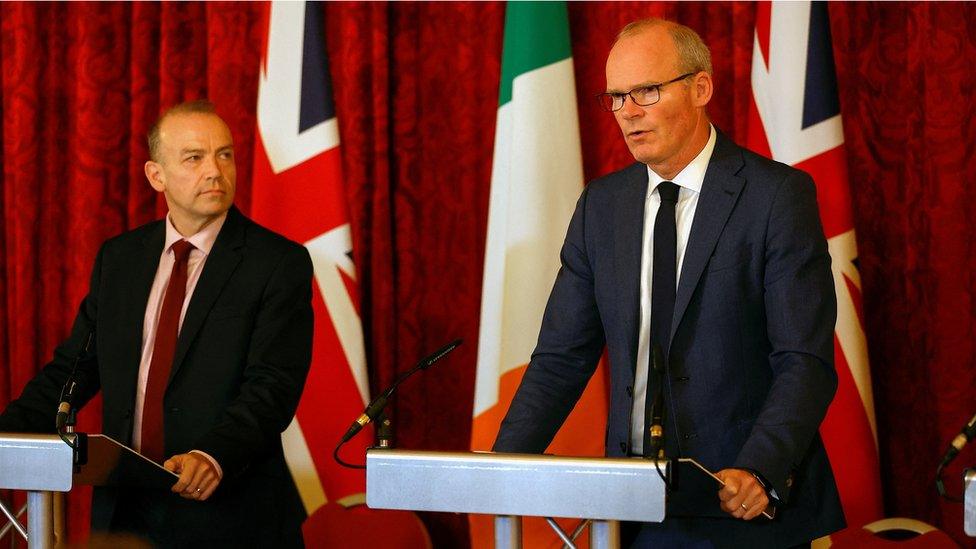
Chris Heaton-Harris and Simon Coveney are at the British-Irish Intergovernmental Conference
Mr Coveney said the conversations with the UK government suggested "we're in a different space" over the issue.
"I believe we're all working in good spirit, with good co-operation to deliver on the changes that are required for the protocol to be fixed or the issues within the protocol to be fixed.
"And we need to show some progress on that," he said.
'New-look British government'
Mr Coveney said the "new-look British government" had made "a positive effort to recalibrate where we are".
He said his government was looking for a "nil-all draw" in negotiations "where everybody can walk away feeling that they haven't won or lost, but they can live with the outcome".
"We want to avoid an election if we can and in the context of not having solved some of the outstanding questions around the protocol, an election means issues like that become totem issues again," he added.
He said an election was more like to to "divide" rather than bring people together.
"I think there is a big onus on the secretary of state and myself and others to try and find a way of avoiding that scenario and establishing a functioning executive and assembly.
In an official statement after the talks, the UK and Ireland agreed to "doing everything possible" to restore power-sharing.
Mr Heaton-Harris hosted Mr Coveney at Lancaster House in London.
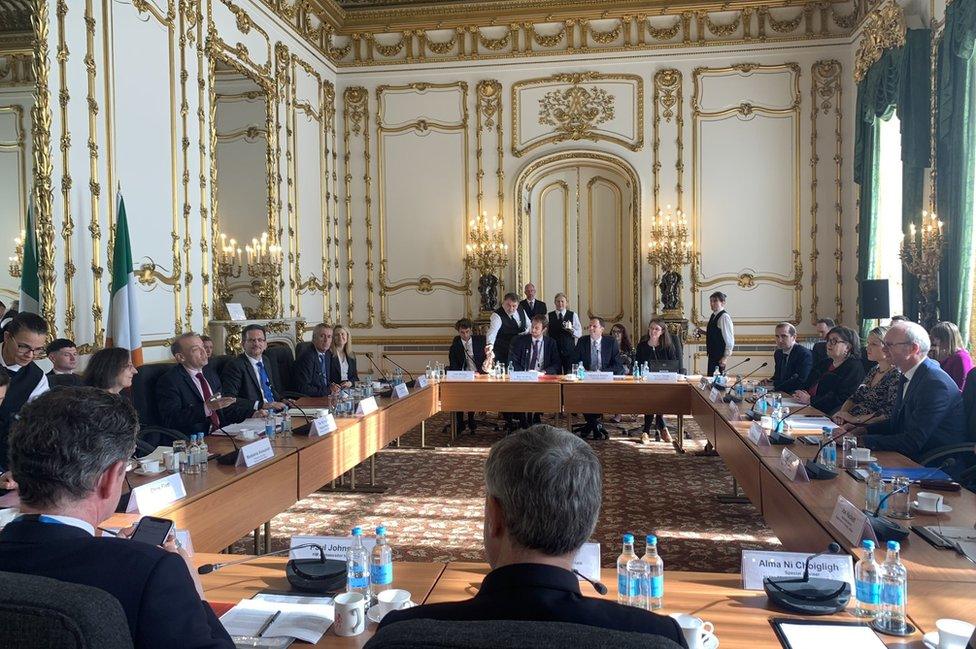
The talks were held at Lancaster House, a London building run by the UK's Foreign Office
Mr Coveney also met Foreign Secretary James Cleverly on Thursday night, where the pair discussed Brexit, the war in Ukraine and issues about the UN Security Council.
"It is sending the signal that they're up for a serious discussion to try to resolve these issues," Mr Coveney told Irish national broadcaster RTÉ, external.
"Dublin and Brussels have noticed this change in approach."
Recent developments have included an apology by Northern Ireland Minister Steve Baker about some of his behaviour towards Ireland and the EU during Brexit.
"Time will tell whether the compromises necessary to get a deal are possible," said Mr Coveney.
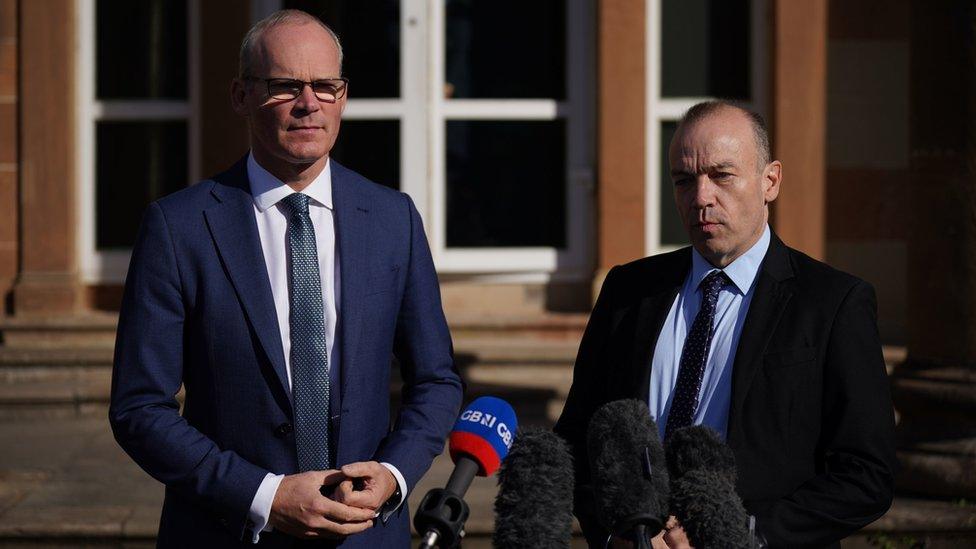
Simon Coveney and Chris Heaton-Harris met at Hillsborough Castle last month
It was Mr Heaton-Harris's first meeting of the BIICG but Mr Coveney's seventh, having attended all of the meetings since it was reconvened in 2018.
Mr Baker and Irish Justice Minister Helen McEntee were also attending.
Mr Baker said that the DUP's concerns had been "acknowledged," but added "this about the whole unionist community."
"I'll keep talking to the DUP but let's not forget this is about all parties. I very much hope that we will find a way to persuade the DUP to join the executive so we can avoid an election," he added.
The meeting focused on plans to mark the 25th anniversary of the Good Friday Agreement.
There are reports that the British and Irish governments are keen for US President Joe Biden to visit Northern Ireland next April.
Friday's meeting came as technical negotiations resume between Brussels and London over the Northern Ireland Protocol.
Relations between London, Dublin and Brussels have improved in recent weeks and there is hope of progress in those talks.
What is the British-Irish Intergovernmental conference?
The BIIGC was established as part of the Good Friday Agreement to promote bilateral cooperation between the British and Irish governments.
It deals with issues that are not devolved to Stormont.
Meetings tend to discuss economic cooperation, security and political stability in Northern Ireland.
It did not meet for 11 years between 2007 and 2018 but since reconvening it has met twice a year.
The UK government is represented by the Northern Ireland secretary while Dublin's foreign minister represents the Republic of Ireland's government.
An additional minister from both administrations attends.
Related topics
- Published18 October 2022

- Published6 October 2022
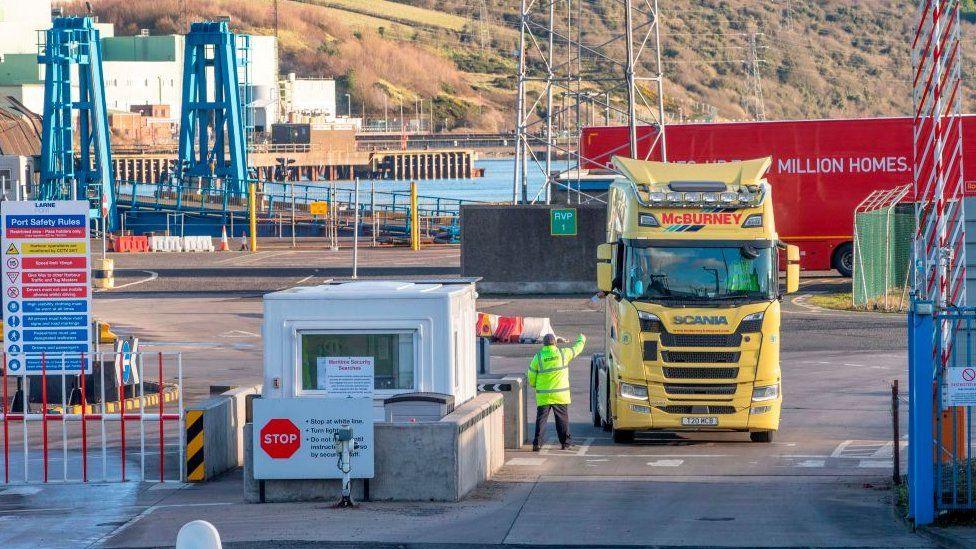
- Published4 October 2022
